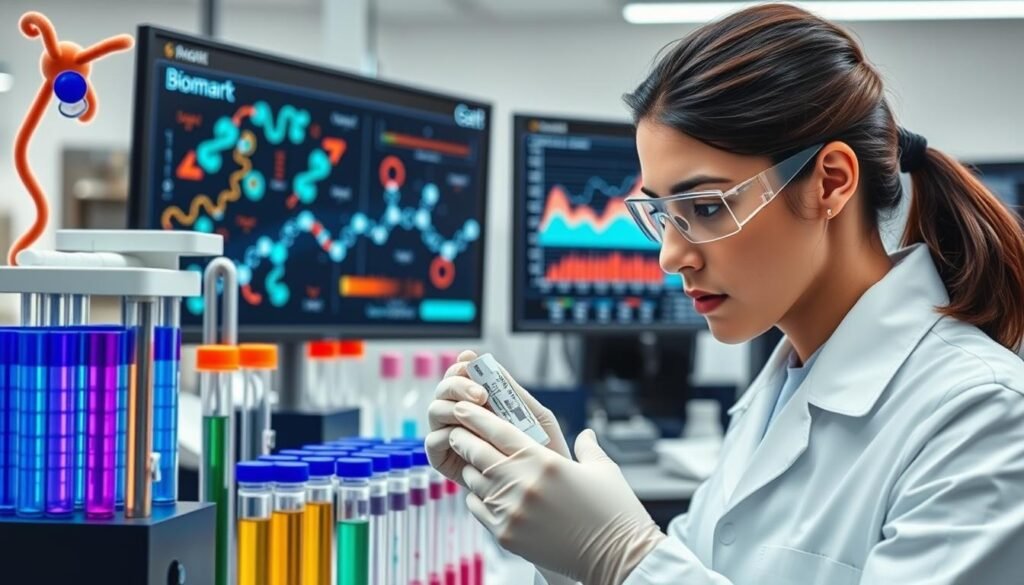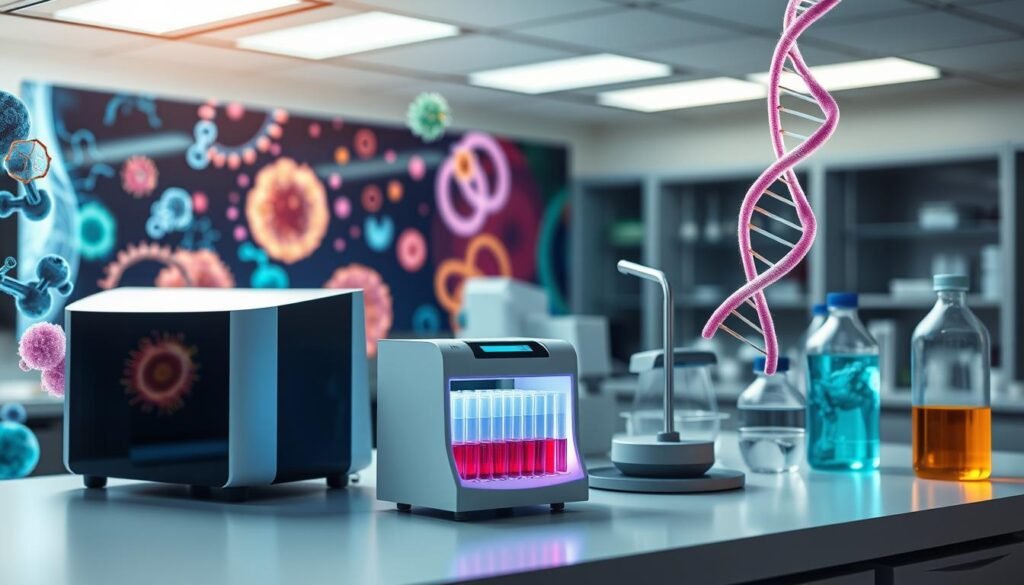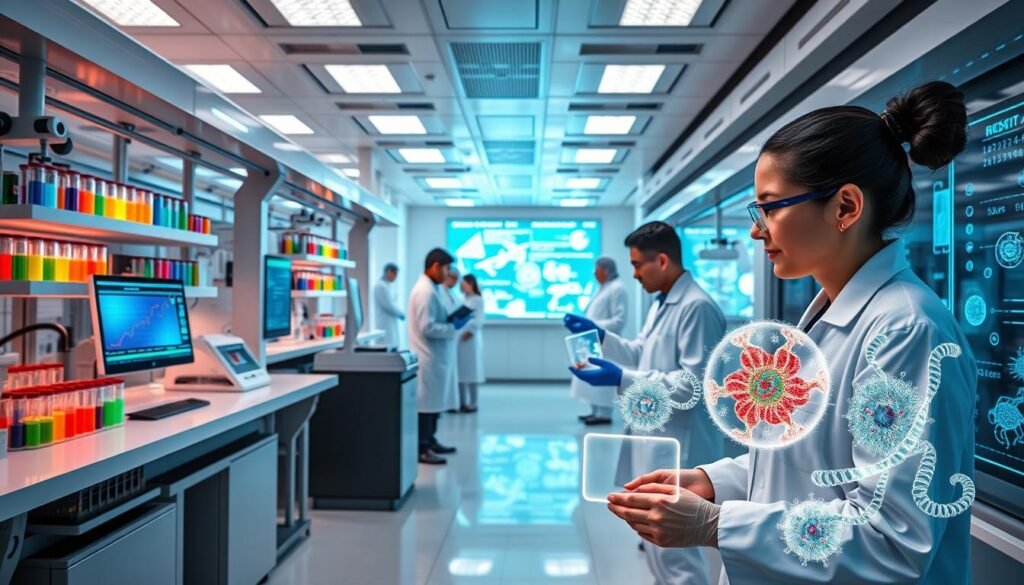Biomarker testing is now suggested for almost 60% of those with cancer. This includes patients with both solid tumors and blood cancers. It’s clear how vital biomarker testing has become for planning cancer treatments. By looking at specific biological markers, doctors can learn about a patient’s unique cancer type. This knowledge is crucial for creating personalized treatments. Such customized care not only offers targeted therapies but also leads to better outcomes for patients.
Today, precision medicine is leading the way in medical breakthroughs, with biomarker testing playing a key role in cancer care. This testing looks at genetic changes, proteins, and substances produced by cancer cells. It allows doctors to tailor treatment plans to fit each patient’s needs. This move towards personalized medicine signifies a major change. It means treatments are designed based on the genetic details of a person’s cancer. Through biomarker testing, doctors can find the best therapies, check how well treatments are working, and make choices that improve patient care.
Key Takeaways
- Biomarker testing is essential for patients with cancer, guiding treatment decisions based on specific tumor characteristics.
- It is a cornerstone of precision medicine, focusing on tailored treatment strategies that improve patient outcomes.
- Insurance providers often cover biomarker testing as a standard of care for various cancer types.
- Liquid biopsies offer a non-invasive method for detecting biomarkers, primarily in lung cancer cases.
- Understanding genetic alterations through biomarker testing can lead to more effective targeted therapies such as ALK inhibitors.
Understanding Biomarker Testing
Biomarker Testing is key to better cancer diagnosis and treatment plans. These biomarkers are special signs in cancer cells that give vital clues about a patient’s cancer. This understanding aids doctors in crafting personalized treatment based on each patient’s unique condition.
There are mainly two kinds of biomarkers to check for: acquired cancer biomarkers and inherited cancer biomarkers. Tests for inherited biomarkers reveal if someone is more likely to get certain cancers. This helps doctors gauge a patient’s risk over their lifetime.
Doctors might ask for more biomarker tests even after the first diagnosis. Cancer changes over time, needing fresh insights for the best treatment adjustments.
Here are common ways to test for cancer biomarkers:
- Biopsy
- Blood test
- Saliva test
- Urine test
The outcome of these tests deeply impacts a patient’s treatment plan. Usually, getting results might take two weeks or more. Test results vary and include:
| Test Result | Implications |
|---|---|
| 1 or more actionable biomarkers found | Shows possible different treatment paths. |
| No actionable biomarkers found | Suggests current treatment might be best. |
| No result obtained | Can happen if the tissue sample is too small; not getting a result doesn’t mean there’s a problem. |
The goal of biomarker testing is to find specific markers. These markers help doctors choose targeted treatments or immunotherapies. This leads to more personalized cancer care.
What is a Biomarker?
A biomarker is a sign in our bodies that tells us about a disease. It helps doctors understand and treat different cancers. For example, genetic changes in cells, protein levels, and other signs can show how cancer is growing.
Definition and Examples
When we ask What is a Biomarker?, we’re finding out how it helps in diagnosis and treatment. In lung cancer, spotting mutations like ALK and EGFR changes how treatment is done. This helps doctors choose the best therapy for each patient.
Types of Biomarkers
There are two main types of biomarkers: inherited and acquired. Inherited ones are passed down in families. Acquired ones come from the environment or our lifestyle. Knowing the difference helps doctors plan better treatments.
The Role of Biomarker Testing in Cancer Treatment
Biomarker testing is crucial in cancer care. It helps doctors make informed decisions. This impacts two main areas: choosing treatments and checking their success.
Identifying Treatment Options
Biomarker testing helps find the right treatments for each cancer. It shows which treatments will work best. For example, about 93% of patients had their treatment chosen this way in the last three years.
It also helps patients skip unnecessary treatments. About 20% could avoid chemotherapy or radiation. Plus, 10% of patients got into clinical trials for new treatments thanks to biomarker testing.
Monitoring Treatment Efficacy
Continuous biomarker testing is key in checking how well treatment works. It lets doctors see if they need to change the treatment. This approach ensures resources are used well and the best treatments are given.
By doing this, patients have better chances of survival and a better experience with their treatment.
| Key Metrics | Statistics |
|---|---|
| Cancer patients with therapy tailored according to biomarker testing | 93% |
| Cancer patients avoiding unnecessary chemotherapy/radiation | 20% |
| Cancer patients eligible for clinical trials due to biomarker testing | 10% |
| Pediatric cancer patients whose insurance covered biomarker testing | 71% |
| Pediatric cancer patients needing prior authorization for biomarker testing | 25% |
| States mandating health plans to cover biomarker testing | 11 |
How Biomarker Testing Helps in Treatment Planning
Biomarker testing is key in making individual treatment plans for cancer patients. It finds unique genetic traits. This helps doctors pick treatments likely to work best. Because everyone’s cancer is different, tailored medicine is crucial in improving cancer care.
Take colorectal cancer as an example. Doctors test for genetic markers like BRAF and KRAS to decide on treatments. Knowing these biomarkers helps avoid therapies that won’t work. For certain alterations, there are special targeted therapies.
The use of biomarker testing goes beyond choosing treatments. It also checks if treatments are working well, allowing for changes as needed. This is crucial because cancer tumors can change quickly.
Regular biomarker testing enhances cancer care. It leads to better, more informed treatment choices. This approach aims to get the best results for patients.

In the end, using biomarker testing in planning treatment means each therapy matches the patient’s unique needs. This leads to better, more personal care for their condition.
| Biomarker | Associated Cancer Type | Clinical Implication |
|---|---|---|
| BRAF | Colorectal Cancer | Targeted therapies available for mutations |
| KRAS | Colorectal Cancer | Guides therapy selection |
| HER2 | Various Cancers | Indicates potential for targeted therapy |
| MSI-H/dMMR | Colorectal Cancer | Identification for immunotherapy candidates |
Precision Medicine and Personalized Treatment
Precision medicine is changing healthcare, especially in fighting cancer. It uses a patient’s unique genes and molecules to design better treatments. This method is reshaping the way we create and give treatments, like precision oncology.
Overview of Precision Medicine
Precision medicine in cancer treatment uses biomarker testing to learn about a person’s cancer. It looks at the genes of cancer cells to find mutations. Then, treatments are customized, making success more likely. Daiichi Sankyo believes biomarker testing is key in precision medicine. This knowledge helps patients talk to doctors about treatment options. Learn more about biomarker testing here.
The Importance of Personalized Medicine in Cancer Care
Personalized medicine is crucial for the best treatment. It looks at the patient’s cancer genes to find the right therapy. This approach leads to better results, especially with the right molecular biomarkers. Teaching and talking about these treatments help patients. It shows why it’s important to keep discussing biomarker testing as treatments improve.
Different Types of Biomarker Tests
Understanding the Different Types of Biomarker Tests is key for better cancer care. This area is always growing, offering new ways for doctors to figure out cancer. Techniques like Next-Generation Sequencing (NGS) and liquid biopsy are important. They let us closely look at cancer’s genetic changes.
Next-Generation Sequencing allows the study of many genes at once. It’s vital for genomic profiling. This helps choose the right therapies. Liquid biopsies, though, use blood to find cancer cells early. They also track the disease with less discomfort.
Immunohistochemistry (IHC) uses antibodies to find antigens in tissues. It’s key for spotting different cancers and hormone receptor positivity. This matters for treatment plans. Methods like whole exome sequencing and cell-free DNA testing uncover important genetic changes. These can guide therapy choices and forecast outcomes.
| Test Type | Description | Application in Cancer Diagnostics |
|---|---|---|
| Next-Generation Sequencing (NGS) | High-throughput sequencing to analyze multiple DNA sequences. | Used for genomic profiling and identifying suitable targeted therapies. |
| Liquid Biopsy | Test on blood samples for circulating cancer cells. | Early detection, treatment planning, and monitoring. |
| Immunohistochemistry (IHC) | Laboratory method to check for antigens in tissue samples. | Aiding in diagnosing specific cancer types and determining receptor status. |
| Whole Exome Sequencing | Analyzes the exonic regions of the genome. | Identifies mutations that may influence cancer treatment options. |
| Genome Profiling | Evaluates genetic alterations in cancer cells. | Enables personalized treatment plans based on individual variations. |
The range of biomarker tests greatly improves our ability to see how treatments might work. Using genomic profiling and other methods, doctors can create customized therapies. These target the unique aspects of cancer, making diagnosis more exact.
The Process of Biomarker Testing
Biomarker testing is key in managing many cancers, like non-small cell lung cancer (NSCLC). It starts with getting the right samples. This is crucial for accurate testing in the lab. The results then help doctors choose the best treatment.
Sample Collection Methods
There are different ways to collect samples for biomarker testing, depending on what the patient needs. Here are some:
- Tissue biopsies: Taking cells from a tumor gives a clear view of its genetic structure.
- Blood draws: More and more, this method is used for its simplicity and non-invasive nature. It finds tumor DNA in the blood.
- Saliva samples: Not as common, but saliva can also show cancer biomarkers.
Nearly half of the people with advanced NSCLC aren’t getting full biomarker tests. This shows we need better methods for collecting and processing samples. These methods are vital. They help give doctors the information they need to plan treatment.
Laboratory Analysis
After collection, the samples go through detailed tests in the lab. Pathologists look for specific biomarkers. This is crucial for choosing how to treat the cancer. The main goal is to find mutations that can be treated, like the KRAS G12C mutation seen in 13% of NSCLC cases. There are also nine key biomarkers for NSCLC that guide the use of targeted therapy or immunotherapy.
The lab results are then put into comprehensive reports for doctors. They use this information to make treatment plans tailored to each patient. This approach, rooted in the biomarker testing process, is a critical step in improving care for cancer patients. It highlights why good sampling and detailed lab analysis are essential in battling cancer.
Benefits of Biomarker Testing in Oncology
Cancer treatment has changed a lot in the last twenty years. Biomarker testing has been key to this change. It helps identify cancer types more accurately, guiding the treatment plan and boosting patient outcomes.
Targeted Therapies and Treatment Customization
Benefits of biomarker testing include guiding the selection of targeted therapies. For breast and lung cancer, knowing tumor biomarkers helps choose the right treatment. This means treatments match the cancer’s genetic profile, improving success chances. Next-generation sequencing (NGS) is good at finding mutations for personalized treatments.
The Role of Companion Diagnostics
Companion diagnostics are crucial in personalized medicine. They match patients with the best therapy for their biomarker profiles. Drugs like Piqray and Lynparza target specific mutations found through testing. Talking with doctors about these tests lets patients find treatments that could improve survival and life quality. Cancer patients should consider these steps for custom treatments.
| Cancer Type | Biomarker Examples | Targeted Therapies |
|---|---|---|
| Breast Cancer | PIK3CA mutations | Piqray, Lynparza |
| Lung Cancer | EGFR mutations | Tarceva, Tagrisso |
| Colorectal Cancer | KRAS mutations | Cetuximab, Panitumumab |

Using biomarker testing, oncology can use new methods for better treatment decisions. Understanding these ideas helps choose the right therapies. It also educates patients about their treatment, allowing them to have informed talks with their doctors.
Challenges and Limitations of Biomarker Testing
Biomarker testing gives important info but comes with hurdles. The challenges of biomarker testing include tech limits, hard access, and insurance issues. Not every medical place offers the same tests. This can limit patient access to vital checks. These checks can guide their treatment choice.
Testing varies a lot across different cancers. For example, about 20%-30% of breast cancers show a lot of HER2. This influences treatment with drugs like trastuzumab. Yet, many patients miss out on these treatments. This happens when tests aren’t available or consistent.
Getting these tests can be tough. From 2018 to 2020, under half of certain lung cancer patients got tested for five key biomarkers. This missing data affects treatment choices. Only 35% of patients got the needed biomarker info before starting their first treatment.
Tools like liquid biopsies could speed up getting test results. These can take 9 days, while tissue biopsies take 15 days. Still, not all health systems offer liquid biopsies equally. This uneven access adds to the biomarker testing challenges. It makes the situation complex for patients and health workers.
Future of Biomarker Testing in Cancer Treatment
Cancer treatment is getting better with new tools that make therapies work better. One key tool is biomarker testing. It’s changing how we find and treat cancer. The future looks bright with big improvements and focus on making tests available for everyone.
Advancements in Molecular Diagnostics
New tools in molecular diagnostics are changing the game. With these tools, doctors can check many biomarkers at once. This makes finding the right treatment faster and more accurate. For example, certain biomarkers in breast and lung cancer help pick the best therapy.
Liquid biopsies are another big step. They use blood tests instead of surgery to keep an eye on cancer. This makes it easier to handle the disease.
Increased Access to Testing
Getting more people access to biomarker tests is key to fight cancer better. There are efforts to make tests available more widely, even in less served areas. Education about these tests is growing. This means more people can get the tests they need on time.
Getting past the hurdles of insurance and other challenges is important. This will help make biomarker tests available to everyone who needs them.

Conclusion
Biomarker testing is a key step forward in cancer treatment. It lets doctors tailor treatment plans to fit each tumor’s unique traits. This focus on individuals means better results and higher survival rates.
The future of fighting cancer looks bright with biomarker testing. New therapies target cancer’s specific genes and proteins. They aim to stop cancer growth with fewer side effects. This way, patients face less harm and enjoy better lives.
Research in biomarker testing is moving fast. It’s becoming a crucial part of treating cancer. By finding out which treatments might stop working, it helps doctors change plans quickly. Biomarker testing is becoming a must-have in cancer care.